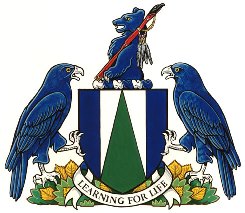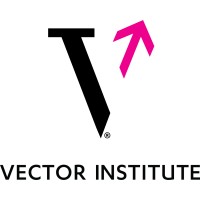Artificial intelligence (AI) is the intelligence of machines or software, as opposed to the intelligence of other living beings, primarily of humans. It is a field of study in computer science that develops and studies intelligent machines. Such machines may be called AIs.

Geoffrey Everest Hinton is a British-Canadian computer scientist and cognitive psychologist, most noted for his work on artificial neural networks. From 2013 to 2023, he divided his time working for Google and the University of Toronto, before publicly announcing his departure from Google in May 2023, citing concerns about the risks of artificial intelligence (AI) technology. In 2017, he co-founded and became the chief scientific advisor of the Vector Institute in Toronto.

Athabasca University (AU) is a Canadian public research university that primarily operates through online distance education. Founded in 1970, it is one of four comprehensive academic and research universities in Alberta, and was the first Canadian university to specialize in distance education.
The Canadian Institute for Advanced Research (CIFAR) is a Canadian-based global research organization that brings together teams of top researchers from around the world to address important and complex questions. It was founded in 1982 and is supported by individuals, foundations and corporations, as well as funding from the Government of Canada and the provinces of Alberta and Quebec.

Richard S. Sutton is a Canadian computer scientist. He is a professor of computing science at the University of Alberta and a research scientist at Keen Technologies. Sutton is considered one of the founders of modern computational reinforcement learning, having several significant contributions to the field, including temporal difference learning and policy gradient methods.

Yann André LeCun is a Turing Award winning French-American computer scientist working primarily in the fields of machine learning, computer vision, mobile robotics and computational neuroscience. He is the Silver Professor of the Courant Institute of Mathematical Sciences at New York University and Vice-President, Chief AI Scientist at Meta.
The UBC Computer Science department at the University of British Columbia was established in May 1968. UBC CS is located at the UBC Point Grey campus in Vancouver, British Columbia, Canada. As of September 2022, it has 65 faculty, 62 staff, 248 graduate students, and 2,763 undergraduates.

Osmar R. Zaiane is a researcher, computer scientist, professor at the University of Alberta specializing in data mining and machine learning. He was the secretary treasurer of the Association for Computing Machinery (ACM) Special Interest Group on Knowledge Discovery and Data Mining (SIGKDD) from 2009 to 2012 and treasurer of the ACM Special Interest Group on Health Informatics. He served as the editor-in-chief of the SIGKDD Explorations publication from 2008 to 2010. He was also the associate editor of the same publication from 2004 to 2007.
Alan Bernstein is Professor Emeritus at the University of Toronto and President Emeritus of CIFAR, where he served as President and CEO from 2012 to 2022. A Distinguished Fellow at the Munk School of Global Affairs and Public Policy, he is also a Fellow and Member of the Standing Committee for Science Planning at the International Science Council (2022-2025). Bernstein is recognized as a leader in health research, science policy, mentorship and organizational leadership.
Shane Legg is a machine learning researcher and entrepreneur. With Demis Hassabis and Mustafa Suleyman, he cofounded DeepMind Technologies, and works there as the chief AGI scientist. He is also known for his academic work on artificial general intelligence, including his thesis supervised by Marcus Hutter.

Ruslan Salakhutdinov is a Canadian researcher of Tatar origin working in the field of artificial intelligence.

Joëlle Pineau is a Canadian computer scientist and Associate Professor at McGill University. She is the global Vice President of Meta's Artificial Intelligence Research department, also known as FAIR, and is based in Montreal, Quebec.

Doina Precup is a Romanian researcher currently living in Montreal, Canada. She specializes in artificial intelligence (AI). Precup is associate dean of research at the faculty of science at McGill University, Canada research chair in machine learning and a senior fellow at the Canadian Institute for Advanced Research. She also heads the Montreal office of Deepmind.
Marzyeh Ghassemi is a Canada-based researcher in the field of computational medicine, where her research focuses on developing machine-learning algorithms to inform health-care decisions. She is currently an assistant professor at the University of Toronto's Department of Computer Science and Faculty of Medicine, and is a Canada CIFAR Artificial Intelligence (AI) chair and Canada Research Chair in machine learning for health.

Mila - Quebec AI Institute is a research institute in Montreal, Quebec, focusing mainly on machine learning research. Approximately 1000 students and researchers and 100 faculty members, were part of Mila in 2022. Along with Alberta's Amii and Toronto's Vector Institute, Mila is part of the Pan-Canadian Artificial Intelligence Strategy.
ELLIS - the European Laboratory for Learning and Intelligent Systems - is a pan-European AI network of excellence which focuses on fundamental science, technical innovation and societal impact. Founded in 2018, ELLIS builds upon machine learning as the driver for modern AI and aims to secure Europe’s sovereignty in this competitive field by creating a multi-centric AI research laboratory. ELLIS wants to ensure that the highest level of AI research is performed in the open societies of Europe inclduing 39 research units, 14 research programs and a PhD & Postdoc Program.
Sheila McIlraith is a Canadian computer scientist specializing in Artificial Intelligence (AI). She is a Professor in the Department of Computer Science, University of Toronto. She is a Canada CIFAR AI Chair, a faculty member of the Vector Institute, and Associate Director and Research Lead of the Schwartz Reisman Institute for Technology and Society.
The regulation of artificial intelligence is the development of public sector policies and laws for promoting and regulating artificial intelligence (AI); it is therefore related to the broader regulation of algorithms. The regulatory and policy landscape for AI is an emerging issue in jurisdictions globally, including in the European Union and in supra-national bodies like the IEEE, OECD and others. Since 2016, a wave of AI ethics guidelines have been published in order to maintain social control over the technology. Regulation is considered necessary to both encourage AI and manage associated risks. In addition to regulation, AI-deploying organizations need to play a central role in creating and deploying trustworthy AI in line with the principles of trustworthy AI, and take accountability to mitigate the risks. Regulation of AI through mechanisms such as review boards can also be seen as social means to approach the AI control problem.
Attabotics is a robotics company based in Calgary, Alberta, Canada that specializes in Automated Storage and Retrieval System (AS/RS) inventory management systems. Founded in 2016, the company designs and manufactures intelligent robots that operate within a modular, three-dimensional storage structure that minimizes the traditional fulfillment center footprint.

The Vector Institute is a private, non-profit artificial intelligence research institute in Toronto focusing primarily on machine learning and deep learning research. As of 2023, it consists of 143 faculty members and affiliates — 38 of which are CIFAR AI chairs — 57 postdoctoral fellows, and 502 students. Along with the University of Toronto, the Vector Institute is affiliated with faculty from universities across Ontario, as well as British Columbia and Nova Scotia.










